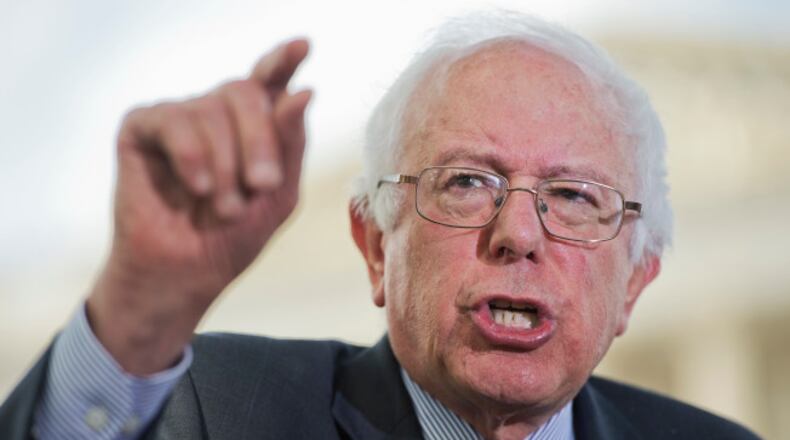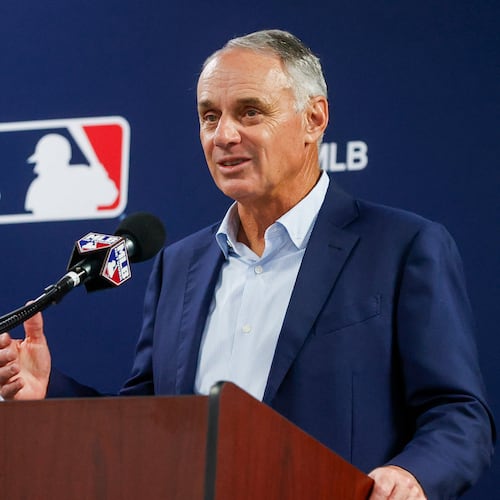"The Socialist surge: The rise of Bernie Sanders is proving awkward for the Democratic Party"
Certainly, Bernie Sanders is surging. In Iowa, Wisconsin and most recently in Maine, the Vermont senator is drawing the largest, most passionate crowds of the political season. Polling indicates that while he is still well behind Hillary Clinton, the gap is closing. He has also raised some $15 million, which may not sound like much in the post-Citizens United world. But unlike Clinton, Jeb Bush and others, Sanders is drawing most of his contributions from small donors, and $15 million is more than enough to sustain a modest campaign.
It's interesting watching the political world try to account for it all. The Politico story, for example, cites Sanders' statement that the economic crisis in Greece should not be resolved by cutting programs for "the poor, the children, the sick and the elderly.” Those comments, we are told, "are a reminder of just how far the second-place Democratic presidential candidate stands from the American mainstream on some issues, and the looming reckoning Democrats face with their party’s leftward drift."
The story goes on to note that Sanders, Sen. Elizabeth Warren and other liberals have pushed the Democrats leftward on issues such as same-sex marriage, equal pay and paid sick leave. The result is allegedly a party that is being drawn away from the American mainstream, with a "looming reckoning" ahead.
But there's one very large problem with that argument:
When you poll people on same-sex marriage, equal pay for women, the minimum wage, paid sick leave for lower-income workers, and yes, higher taxes on the rich, the positions taken by Sanders almost always get majority and in some cases overwhelming public support.
As Sanders puts it, "I don't believe it is a terribly radical idea to say that someone who works 40 hours a week should not be living in poverty." And 78 percent of the American people agree with him. Go through the list of issues, and the story repeats itself:
- More than 70 percent back an increase in the minimum wage.
- Eighty-five percent support paid sick leave to employees who are ill.
- Eighty-five percent believe that money plays too much of a role in politics, and that the campaign-finance system needs fundamental change or a complete rebuild.
- Sixty-six percent believe the government does too much to help the wealthy, and 72 percent believe it does too little to help the middle class.
The attempted redefining of the mainstream on taxation issues is particularly awkward, to use Politico's term. An Associated Press poll earlier this year found that 68 percent of Americans think the wealthy pay too little in taxes, which is Sanders' position; 11 percent said the rich pay too much, which is essentially the position taken by Republican presidential candidates.
Gallup reports almost identical numbers, with 11 percent saying the wealthy pay too much in taxes and 62 percent saying they pay too little. And with both the Dow and corporate after-tax profits at near-record highs, 69 percent of Americans told Gallup that corporations pay too little in taxes; just 9 percent agreed with the Republican position, which is that corporations pay too much
It takes an impressive amount of "interpretive jiggery-pokery" to classify a candidate espousing views shared by two-thirds of Americans as "out of the mainstream," especially when compared to a party bound to economic policies supported by just one in 10 Americans. It's even more telling when Politico resorts to a quote from Gov. Bobby Jindal -- the man with the support of 1.3 percent of GOP voters -- to confirm Sanders' standing outside the mainstream.
In short, the Politico piece and others like it pose a fascinating question: Can a politician who espouses positions that are supported by a majority of Americans also be outside "the American mainstream"? And the answer is a surprising yes.
You see, "the American mainstream" is an entirely artificial construct. The "mainstream" is defined not by polls or public opinion, but by what is deemed acceptable by those in positions of power and influence. It has not been acceptable to say the things that Sanders is saying, especially not the way that he is saying them; it has not been "mainstream." He's saying them anyway, and by doing so he is redefining and broadening that mainstream. It's a wonderful thing.
That said, I don't believe that Sanders will be or even should be the Democrats' nominee; in his quieter, private moments, I suspect Sanders himself might agree. He's not really running to become president, he's running in the long, honored tradition of people trying to communicate a message. And in his case, the response that message is drawing is telling us all something important, even if a lot of people are trying to ignore or misconstrue it.
About the Author
Keep Reading
The Latest
Featured

